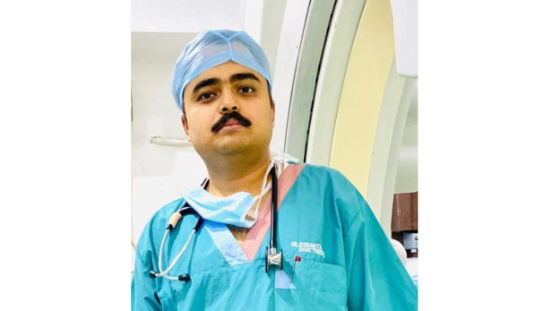Heart Conditions
Stay Ahead of Hypertension: Effective Screening and Prevention Tips
4 min read
By Apollo 24|7,Reviewed by Dr. Divya Chandrasekharan, Verified by Dr. Srividya Kalavagunta, Published on - 13 August 2024
Share this article
0
0 like
.jpg?tr=q-80)
Hypertension is a growing concern in India, affecting nearly 30% of the adult population. This alarming rise is primarily because of changing lifestyle factors, making high blood pressure a worrisome issue in the country. As modern living habits continue to evolve, the prevalence of hypertension has surged, underscoring the urgent need for awareness and proactive management.
This article will explore the most essential aspects of hypertension, focusing on effective screening methods and prevention. Understanding how to detect high blood pressure early and adopting lifestyle changes can reduce the risk of complications associated with this silent but severe condition.
Understanding Hypertension
Hypertension is when the blood exerts excessive force against the artery walls, posing serious health risks. It forces the heart and other organs to work harder, potentially leading to heart attacks, strokes, and kidney failure. Additionally, it can damage blood vessels in the eyes, limbs, lungs, and the brain. Fortunately, it is often preventable and treatable with healthy lifestyle choices and sometimes medication.
Screening for Hypertension
Screening refers to medical tests done by doctors to check for diseases before a person develops signs or symptoms. Screening for hypertension involves measuring blood pressure using a sphygmomanometer.
Adults over 18 should check their blood pressure at least every two years. However, those aged 40 and older, as well as younger adults aged 18 to 39 who are at higher risk for hypertension, should have their blood pressure checked annually.
Risk factors include:
- Being overweight or obese
- Smoking or tobacco chewing
- Alcohol consumption
- Leading a sedentary / low-active routine
- Having a diet high in salt and processed foods
- Presence of other medical conditions like diabetes, thyroid disease, kidney disease.
What Do Blood Pressure Readings Mean?
- Blood pressure is measured using two numbers: systolic pressure and diastolic pressure.
- Systolic pressure is the pressure during a heartbeat, and
- Diastolic is the pressure between heartbeats.
- Normal blood pressure is systolic less than 120mmHg and diastolic less than 80mmHg (120/80 mmHg).
- Hypertension is defined as blood pressure of 130/80 or higher. Regularly monitoring these numbers is essential for managing and understanding health risks.
High blood pressure is 120 to 129 systolic and less than 80 diastolic
Hypertension stage 1 is 130 to 139 systolic or 80 to 89 diastolic
Hypertension stage 2 is 140 or higher systolic or 90 or higher diastolic
How to Check Blood Pressure at Home
Taking charge of your health starts with the simple yet powerful act of monitoring your blood pressure at home. With the convenience of home blood pressure monitors, you can keep track of your heart health in the comfort of your own space. Let's look at the steps involved in ensuring accurate readings at home.
- Select a reliable blood pressure monitor, preferably an automatic one with a cuff that fits your upper arm.
- Avoid caffeine and smoking, and exercise 30 minutes before measuring.
- Rest your arm at heart level on a flat surface while sitting in a chair with your feet flat on the floor.
- Wrap the cuff around your bare upper arm, about an inch above the elbow.
- Ensure it is snug but not too tight; you should be able to fit two fingers under the cuff.
- Follow the monitor's instructions to start the measurement.
- Stay silent while the monitor inflates the cuff and takes the reading.
- Note the reading, including the systolic and diastolic pressures.
How to Prevent Hypertension
- Healthy diet: Reduce salt intake and eat a balanced diet of fruits, vegetables, and whole grains.
- Weight Loss: Obesity is having excess body fat, which can lead to serious health issues. Maintain your weight in a healthy range.
- Engaging in physical inactivity: Physical inactivity leads to weight gain, a risk factor for high blood pressure. Engage in regular physical activity to help the heart and blood vessels stay strong and healthy, which may lower blood pressure.
- Stress management: High stress levels can lead to a temporary increase in blood pressure. Techniques such as yoga or meditation can help control stress-induced blood pressure rises.
- Avoid alcohol and smoking: Drinking too much or regularly alcohol can increase your blood pressure. Smoking can damage the heart and blood vessels. Limit or avoid these to keep your blood pressure in check.
Conclusion
Managing hypertension effectively requires regular monitoring, a healthy lifestyle, and following medical advice. Early detection through routine check-ups and lifestyle changes is crucial in keeping hypertension in check and boosting long-term health. By embracing proactive health management with regular screenings and healthy habits, you can significantly enhance your quality of life and minimise the risks of high blood pressure.
Services like Apollo 24|7 can be invaluable when more guidance is needed. They provide easy access to healthcare professionals, convenient at-home lab tests, and necessary consultations. By engaging specialists such as cardiologists and endocrinologists, individuals can receive specialised care tailored to their health situation, ensuring the effective management of hypertension.
Services
Heart Conditions
Consult Top Cardiologists
View AllLeave Comment
Services
Recommended for you
.jpg?tr=q-80)
Heart Conditions
From Causes to Control: An Overview of Hypertension
Hypertension affects millions of people worldwide, including many in India. Hypertension or high blood pressure is when the blood pressure is continuously high. The force of blood against artery walls while the heart pumps blood is known as blood pressure. Hypertension can put one at risk for heart disease, stroke, and renal failure, among other conditions. To effectively manage this condition, routine examinations and early detection are essential.

Heart Conditions
Arrhythmia: Causes, Symptoms, Diagnosis, Treatment & Prevention
Keep your heart healthy by understanding arrhythmia. Learn its causes, symptoms, diagnostic methods, treatment options, and preventive measures.

Heart Conditions
Research Says Marijuana Use Can Damage Your Heart!
Many governments worldwide have legalised the use of marijuana for medicinal and recreational purposes. However, studies have found that using cannabis can have an adverse impact on your heart health. Read on to find out more about this drug's association with heart health.
Subscribe
Sign up for our free Health Library Daily Newsletter
Get doctor-approved health tips, news, and more.
Visual Stories

Easy Cardio Exercises to Keep Your Heart Healthy
Tap to continue exploring
Recommended for you
.jpg?tr=q-80)
Heart Conditions
From Causes to Control: An Overview of Hypertension
Hypertension affects millions of people worldwide, including many in India. Hypertension or high blood pressure is when the blood pressure is continuously high. The force of blood against artery walls while the heart pumps blood is known as blood pressure. Hypertension can put one at risk for heart disease, stroke, and renal failure, among other conditions. To effectively manage this condition, routine examinations and early detection are essential.

Heart Conditions
Arrhythmia: Causes, Symptoms, Diagnosis, Treatment & Prevention
Keep your heart healthy by understanding arrhythmia. Learn its causes, symptoms, diagnostic methods, treatment options, and preventive measures.

Heart Conditions
Research Says Marijuana Use Can Damage Your Heart!
Many governments worldwide have legalised the use of marijuana for medicinal and recreational purposes. However, studies have found that using cannabis can have an adverse impact on your heart health. Read on to find out more about this drug's association with heart health.



